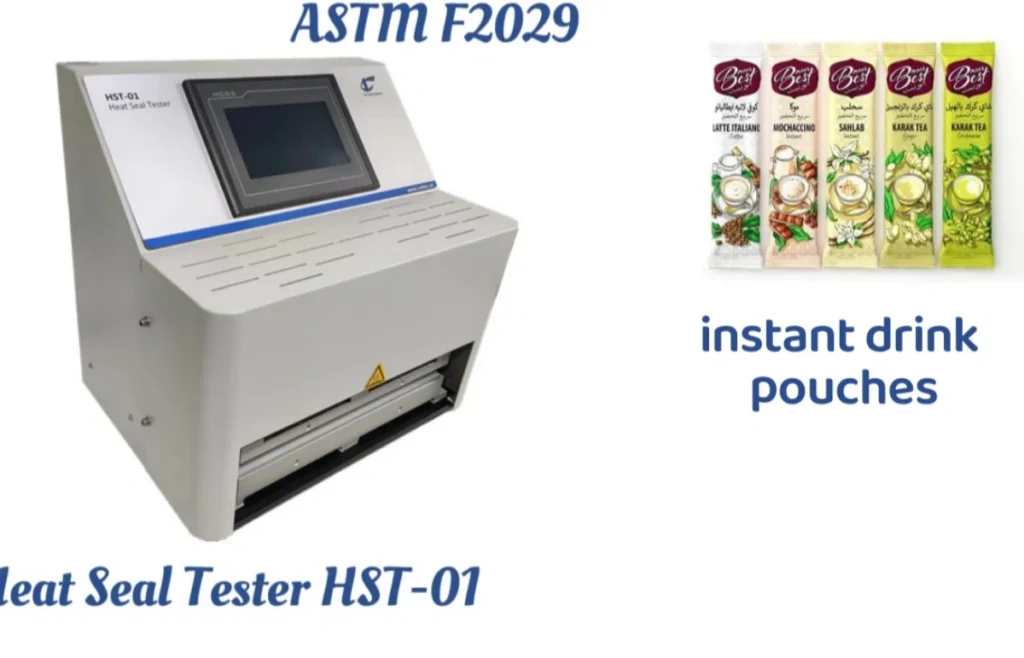Introduction
Instant drink pouches are a popular choice for beverage packaging, thanks to their convenience, portability, and ability to preserve product freshness. However, to ensure their durability and safety, it is crucial to test their heat seal integrity. Heat seal testing, especially following ASTM F2029 guidelines, is a key procedure to determine the strength and reliability of the seals used in these pouches.
In this article, we’ll explore the importance of heat seal integrity testing, the specific requirements of ASTM F2029, and how the Cell Instruments Heat Seal Tester HST-01 can aid in achieving reliable, high-quality pouches.
What Is Heat Seal Integrity Testing?
Heat seal integrity testing is the process of evaluating the strength and consistency of the seals formed during the packaging of flexible materials like instant drink pouches. This test is critical for ensuring that the pouches remain securely sealed during handling, transportation, and storage, preventing contamination and leakage.
The Role of ASTM F2029 in Heat Seal Testing
ASTM F2029 provides standardized practices for testing heat seals on flexible barrier materials. These standards ensure that manufacturers measure and verify the heat sealability of materials, which is vital for producing high-quality products like instant drink pouches.
The standard specifies testing methods to measure seal strength, taking into account material properties such as thickness and construction. ASTM F2029 is particularly helpful for determining the optimal sealing conditions (temperature, pressure, and dwell time) and understanding how material properties affect the final seal.
Key Steps in ASTM F2029 Heat Seal Testing
Specimen Preparation: The first step involves preparing the pouch specimens by marking the machine direction and ensuring proper alignment. The specimens should be sealed in the same location for consistency.
Calibration and Alignment of Equipment: Before starting the test, it’s crucial to calibrate the heat sealer and ensure the jaws are properly aligned for accurate results.
Sealing Conditions: The sealing temperature, dwell time, and pressure should be set according to the material being tested. For accurate results, both sealing jaws should be at the same temperature, and pressure should range from 276 to 483 kPa (40 to 70 psi).
Testing and Analysis: Once the pouch is sealed, the seal strength is measured using methods like Test Method F88. The seal is then tested by pulling the strip until failure, and the data is used to determine the seal’s strength and durability.
Why Is ASTM F2029 Important for Instant Drink Pouches?
The strength and durability of heat seals in instant drink pouches are critical for maintaining product integrity. If the seals are weak, the product could leak, potentially spoiling the drink or contaminating it. Moreover, improper sealing could result in a shorter shelf life, which is detrimental to the brand’s reputation and customer satisfaction.
By adhering to ASTM F2029, manufacturers can:
Ensure pouches are sealed to the right specifications.
Guarantee the product remains intact and safe throughout its shelf life.
Comply with industry standards and improve consumer trust.
Cell Instruments Heat Seal Tester HST-01: The Ideal Solution
Lorem ipsum dolor sit amet, consectetur adipiscing elit. Ut elit tellus, luctus nec ullamcorper mattis, pulvinar dapibus leo.To perform ASTM F2029 testing accurately, Cell Instruments’ Heat Seal Tester HST-01 is a highly recommended solution. This tester is designed to simulate real-world sealing conditions and help you generate reliable data for evaluating the heat seal strength of flexible materials like those used in instant drink pouches.

Key Features of the Heat Seal Tester HST-01:
Precise Temperature Control: Ensures accurate seal strength testing across various materials.
Adjustable Pressure and Dwell Time: Simulates actual manufacturing conditions, providing a comprehensive evaluation.
Ease of Use: Streamlined design allows for quick setup and testing, improving efficiency in production and quality control.
Conclusion
Heat seal testing is an essential process for ensuring the reliability and safety of instant drink pouches. By following ASTM F2029 guidelines, manufacturers can assess the strength and integrity of the seals used in their packaging. With the help of reliable testing equipment like the Cell Instruments Heat Seal Tester HST-01, quality control teams can efficiently perform tests and maintain the high standards required for consumer safety and satisfaction.
FAQ
Why is heat seal integrity testing important for instant drink pouches?
Heat seal integrity testing ensures that the pouches remain sealed during transportation and storage, preventing leaks and contamination.What is ASTM F2029?
ASTM F2029 is a standard practice that outlines the procedures for testing the heat seal strength of flexible materials like those used in packaging.What are the ideal sealing conditions for testing instant drink pouches?
The ideal conditions depend on the material, but generally, the temperature should be consistent across the sealing jaws, and pressure should range between 276 and 483 kPa.How can the Cell Instruments Heat Seal Tester HST-01 help?
The HST-01 helps simulate real-world sealing conditions, providing precise temperature control and adjustable pressure to accurately test seal strength.What should manufacturers do if their pouch seals fail during testing?
Manufacturers should adjust the sealing parameters, such as temperature or pressure, to improve the seal strength and re-test until the desired results are achieved.
